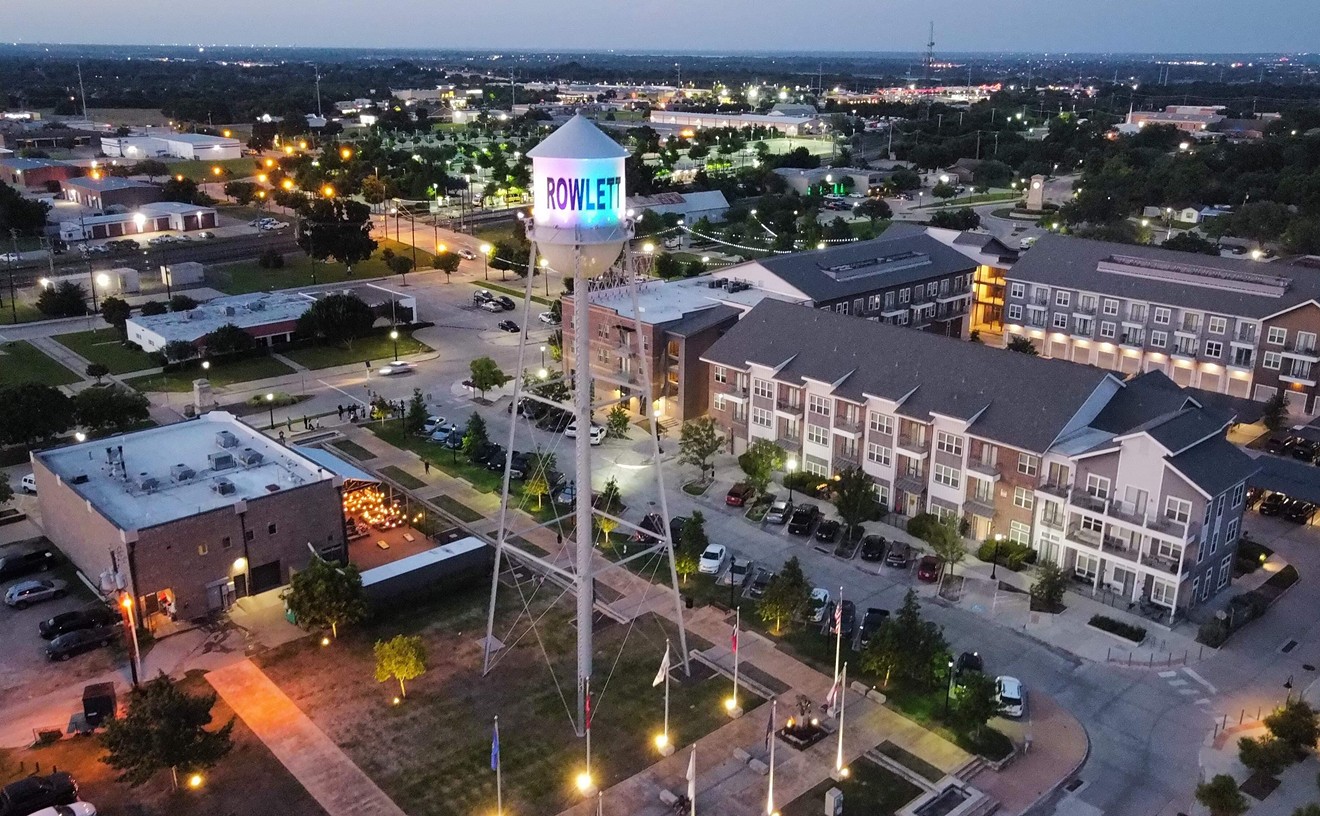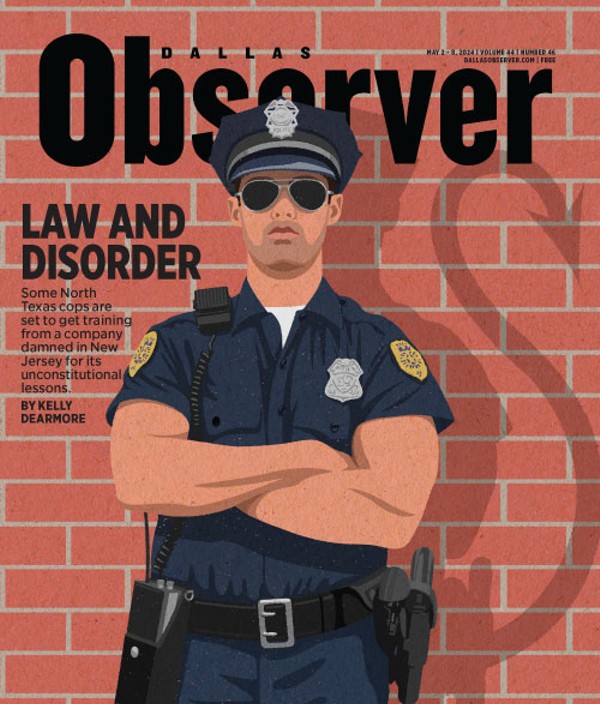Hey, when you saw the story in The Dallas Morning News last week about how the city council is going to approve a $5 to $6 million settlement with half a dozen demoted police officials, did you happen to wonder what was going on? I know I did.
Typical day. Open your Morning News. Read a big story. Sip your coffee. Think to yourself, "Wow, that was a big story. It had a big headline. Something must be going on. I wonder if we'll ever find out what."
I'm sure people felt like this on a lot of mornings in the old Soviet Union, perusing their Pravda over a beaker of vodka.
Why, all of a sudden, would the city attorney be telling the council it needs to pony up this huge settlement, which sounds more like it's going to be $7 to $9 million by the time it's done? That's almost half the entire projected budget deficit for the city this year.
And why is the judge ordering the city's lawyers to reveal their confidential attorney-client communications with Dallas Police Chief Terrell Bolton in the case? I spent a lot of time on the phone last week trying to get people to answer that one for me.
Nobody would talk. Much.
But it comes down to this: The primary reason a judge is going to order your lawyer to reveal his privileged advice to you is if the judge suspects that you and/or the lawyer may have perpetrated some kind of criminal fraud on the court. Here, then, is a possibility too obvious to ignore: The city attorney may be telling the council members they need to hurry up and slap some big, big money on these plaintiffs because, if they don't, the lawsuit will reveal major wrongdoing on the city's part.
Like fibs. Under oath. Maybe.
But how is it even possible to have committed a screw-up so bad that it's worth $9 million to make it go away? Well, I think it's way possible, but that's because of how I think. I write about the city's smaller screwups all the time. The only difference I see here is that these are big-dog plaintiffs with big-dog lawyers.
Example: I have written a lot in the past about Donato Garcia, a 45-year-old Mexican immigrant construction worker arrested by police in April of last year for "failure to identify"--that is, failing to come up with his driver's license or other form of identification quickly enough to satisfy a Dallas police officer who wanted to see it.
It's illegal to arrest people for failure to i.d. Always has been. People in this country are not required to carry identity papers.
Garcia was much luckier than most defendants of modest means: He attracted the attention of a lawyer, David Davis, who was offended by what had happened and was willing to fight without demanding the $10,000 to $20,000 retainer you and I would have to pay up-front to get this kind of representation.
Davis steered his client to the Civilian/Police Review Board, where he won a clear vindication. The board said the cop in question had done wrong.
Then Davis took Garcia to state court, where a jury found him not guilty of a resisting-arrest charge the police had piled on.
Only one thing was left--the original charge of failure to i.d.
But when Davis took his client to the municipal court of Judge Jay Robinson on the failure to i.d. charge, he was amazed to learn that Garcia had already been convicted, without a trial, without Garcia's knowledge and without Davis' knowledge. Another lawyer, whom Garcia did not even know, had come to Robinson in the company of a couple of assistant city attorneys and had entered a guilty plea for Garcia behind his back.
When Davis went to Judge Robinson and pointed out what had happened, Robinson responded with a five-page legal opinion, all of which came to one point: The deadline for asking a judge to overturn his own verdict is 10 days. Davis came to him 48 days after the verdict.
Tough toenails. The verdict stands.
You wonder what's going on, right? Why on earth would they find the guy guilty behind his back and then refuse to set it aside when they found out what had happened?
Good question.
Walter A. Knowles, the attorney who entered the guilty plea for Garcia, basically says he was duped into doing the plea for Garcia by the city attorney. Knowles had signed for Garcia's bond the night Garcia was arrested. Garcia and his family say they had never heard of Knowles. They went to a bond company to get Garcia out. Knowles' name was never mentioned. But Knowles signed on Garcia's bond.
Knowles, you see, is part of the machinery the Dallas municipal court system uses to skirt state law on bonding requirements and to keep the wheels of justice greased. Without going into every nut and bolt, the deal is that bonding companies only have a certain total amount they can take on when they are guaranteeing people's bonds to get them out of jail. But lawyers can simply sign to get somebody out, without any limit.
You go to a bonding company and pay them a fee to get a family member out of jail. You go home. They call a lawyer and ask him to go sign your family member out of jail. It doesn't count against their limit.
And what's in it for the lawyer? The law says a lawyer can't sign for somebody's bond unless he represents that person. But the municipal court system gives a big wink-wink to all of this and pretends that all of the lawyers whose names are signed for people's bonds actually represent those people, even though the people have never heard of the lawyers.
The lawyers typically send the people they have signed out of jail a letter that says in big bold type: I DO NOT REPRESENT YOU. But I could. But you would have to send me some moolah first.
So the lawyer maybe gets some business. The bonding companies slick their way out of their bonding limits. The courts keep the wheels turning.
In the Garcia case, the city may have pushed this already slippery business just a little too far. If Garcia's lawyers are right, the city attorney used the wink-wink bond-lawyer apparatus to nail Garcia with a guilty plea behind his back.
In a sworn deposition, Knowles has testified that an assistant city attorney told him to come do the guilty plea for Garcia and told him not to go first and get the customary paperwork on Garcia. The paperwork would have shown that Garcia was now represented by a new lawyer, Davis, and wanted to go to trial.
But the only thing the guilty plea in absentia accomplished was to stiffen Davis' resolve. In fact, Davis was joined by William Dippel, another lawyer sufficiently offended by this process to commit his time without advance payment.
Davis and Dippel went to state court and asked a judge to allow them to take sworn depositions from Judge Robinson, the assistant city attorneys involved and certain other officials.
And this is where we get back to the issue of the office of city attorney and how it operates.
You've got a guy who clearly was shafted. He was arrested on a bogus charge. He was found guilty without his own knowledge. And now you also know that he is not going away. He has two good lawyers. He and they are in it for the duration.
So if you're the city attorney, what do you do? Negotiate? Get down to brass tacks? Admit that something is broken here and try to fix it?
No. Never.
You get the case removed to federal court. Why? Because normally in small-time deals, when the city gets a case removed to federal court, the lawyers have to go to the client and say, "Donato, we're in federal court now. Way more rules, more procedures, more work. You probably need to give us another check for $10,000."
By a very loose, informal calculation, I estimate that Garcia--had he been paying full freight all the way along in this deal--would already be down $25,000 to $30,000.
And that's how the city operates. They have bottomless pockets, because their pockets are lined with your money and mine. They foot-drag. They run the clock. They run up the bill. They run you out of money. It's all rope-a-dope, to see how far you can go until you're broke.
And if anybody ever does face them down and take them all the way to high noon, the way the lawyers for the demoted cops have done, they just pay them off. With five or nine mil' of your money and mine.
By the way, the federal judge to whom the Garcia case was taken, Sidney A. Fitzwater, poured the city out of federal court at the end of last month. Without even waiting for Garcia's lawyers to argue that the city had no business bringing the case to federal court, Fitzwater kicked them out on his own. He sent the city of Dallas packing back to state court and levied a nominal fine against the city to make it plain he thought they had acted in bad faith by bringing the case to federal court.
The case of the demoted cops--high-profile story, big amounts of money, city council issue--is merely a window on a system that grinds people into poverty and law into chaff every day of the week. But you don't hear about it most of the time, because most of the people involved don't rate the media attention.
And we're going to kick in an extra $9 million to defend these guys? Ouch.











